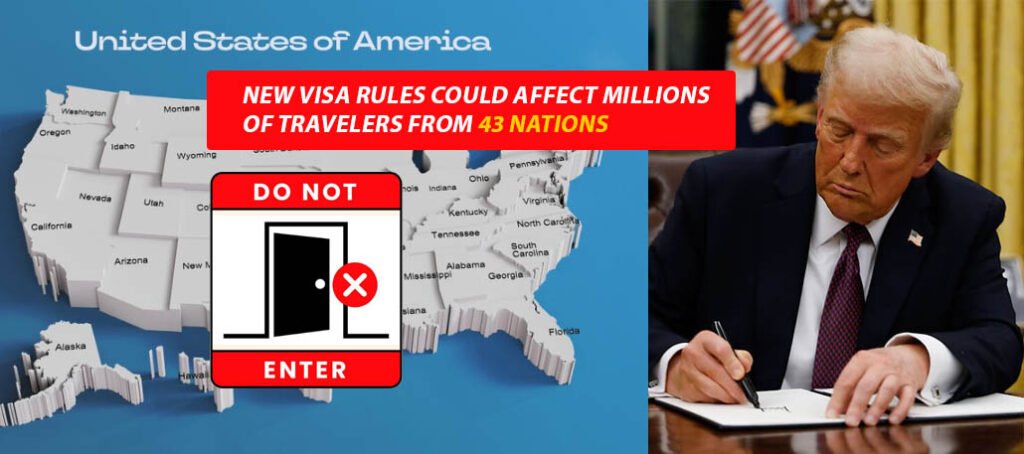Controversial Trump Travel Ban Returns with Tougher Restrictions on 43 Countries.
According to recent reviews, the Trump management is once more considering enforcing new tour bans and boundaries for foreign nationals. Known as the “Trump Travel Ban,” this proposed change has precipitated controversy and challenges for each legislators and vacationers. Let’s observe the specifics of the maximum recent activities surrounding this contentious ruling.
Controversial Trump Travel Ban Returns with Tougher Restrictions on 43 Countries
What is the Trump Travel Ban?
When President Donald Trump issued an executive order restricting travel from a number of nations in 2017, the “Trump Travel Ban” first gained attention. New nations were added to the list when the limits were modified and updated throughout time. The new version of the Trump Travel Ban is expected to affect a significant number of countries, with key differences in the level of restrictions imposed on travelers. As of March 2025, the administration is considering measures that could once again change how citizens from certain countries enter the U.S.
Potential Countries Affected by the Trump Travel Ban
According to an internal memo that has been leaked, the Trump administration is planning to impose strict travel bans on citizens from over 40 countries. The travel restrictions are expected to fall into three main categories: full visa suspensions, partial visa suspensions, and conditional partial suspensions. Security, terrorism, and poor intelligence-sharing cooperation between the United States and the impacted countries are the reasons behind the introduction of these regulations.
Full Visa Suspensions
The first category of restrictions would involve full visa suspensions for citizens from certain countries. The list of affected nations includes:
1. Afghanistan
2. Cuba
3. Iran
4. North Korea
5. Venezuela
If the travel ban is implemented, citizens from these countries would be entirely barred from entering the U.S., except for certain emergency cases or for diplomatic purposes.
Partial Visa Suspensions
In the second category, some countries will face partial visa suspensions. This means that certain types of visas, such as tourist or student visas, would be restricted, while other categories of travel may still be permitted. Countries such as:
6. Eritrea
7. Haiti
8. Myanmar
9. Somalia
10. Sudan
11. Syria
12. Yemen
13. Libya
14. Nigeria
15. Ghana
16. Angola
17. Pakistan
18. Belarus
19. Sudan
20. Nigeria
21. Tanzania
are contained in this list. Until these countries fulfill specific requirements specified by the U.S. government—which may include better security cooperation—the limitations will be put into effect.
Conditional Partial Suspensions
The final category involves conditional partial suspensions for countries that fail to meet specific security and intelligence-sharing requirements. These nations will be given a 60-day period to address the deficiencies. If these countries fail to comply, the travel ban could become more severe. Countries like:
22. Belarus
23. Angola
24. Pakistan
25. China
26. Russia
27. Brazil
28. Egypt
29. India
30. Indonesia
31. Turkey
32. Bangladesh
33. Malaysia
34. Philippines
35. Mexico
36. South Africa
37. Qatar
38. United Arab Emirates
39. Saudi Arabia
40. Sri Lanka
41. Kosovo
42. Albania
43. Serbia
Are reportedly in this list. These nations are expected to improve their cooperation with U.S. Authorities so that it will keep away from further regulations.
Why the Trump Travel Ban?
National safety is the primary motivation behind the Trump travel ban. Concerns approximately a few countries’ loss of cooperation in combating terrorism and ensuring secure global journey had been voiced by way of the Trump administration on several events. The updated restrictions aim to prevent any potential threats from entering the U.S. by limiting the number of individuals who can travel from nations with poor track records in counterterrorism efforts.
Moreover, the Trump administration is keen on reducing the risks posed by illegal immigration. The high visa requirements are meant to guarantee that only individuals who fulfill the security requirements of the United States are permitted entry. Despite the controversy surrounding these travel restrictions, the government has stood by its claim that they are essential for the protection of the American people.
Impact on Travelers and Diplomacy
The new Trump Travel Ban might pose serious problems for millions of humans. Reuniting with cherished ones may be challenging for U.S. Citizens who’ve family within the impacted nations. Additionally, specialists and students from the banned countries can also have fewer alternatives for similarly schooling and employment.
Diplomatic ties among America and the impacted international locations may additionally doubtlessly be strained due to the travel restrictions. Countries that already disagree with U.S. Overseas policy, consisting of Iran and Cuba, may additionally view the travel restriction as a similarly act of aggression. Retaliation could result from this, impacting diplomatic discussions, worldwide exchange, and even journey among these international locations and the USA.
Trump Travel Ban’s Legal and Political Challenges
Throughout its existence, the Trump Travel Ban has encountered many legal challenges. As anticipated, civil rights organizations will likely challenge this new set of restrictions in court, claiming that it discriminates against individuals on the basis of their country or religion. The courts will ultimately make the final decision; based on their reading of US law, they may either uphold or prohibit the ban.
(Learn more about U.S. security and immigration policies at the DHS website)
Conclusion
The Trump Travel Ban is once again making headlines in 2025 with proposed changes that could affect citizens from 43 countries. Although security justifications help the brand-new limits, its miles predicted that they may pose serious difficulties for tourists and might purpose tensions with other nations. It is unclear how those measures might be done and whether they will face up to criminal scrutiny as the U.S. Government advances with them. For the time being, traffic from impacted countries need to stay aware of and prepared for any modifications to U.S. Visa regulations.
You May Read:
